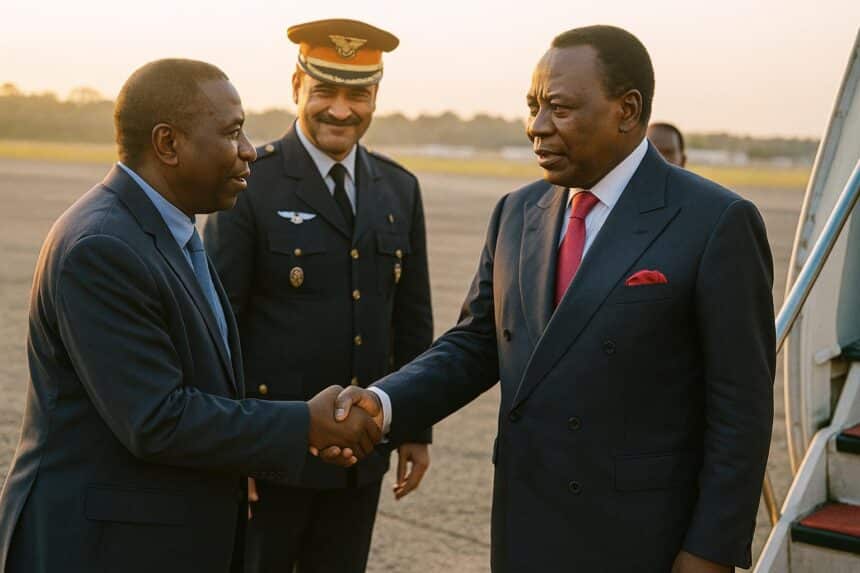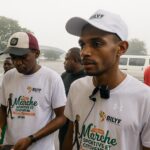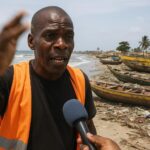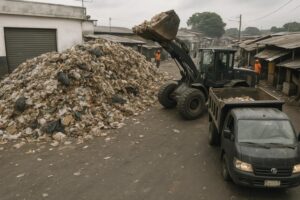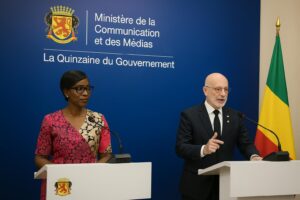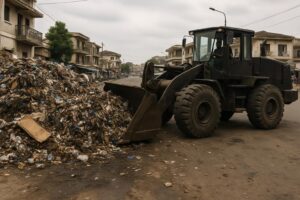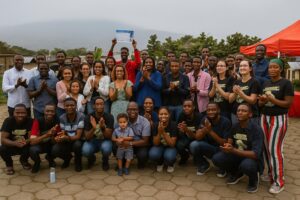Road to Belém
Under a dense early-morning drizzle, President Denis Sassou N’Guesso stepped off the presidential jet in Belém on 5 November 2025, greeted by Amazonian drums and Congolese flags waved by the diaspora. His arrival sets the tone for an ambitious COP30 fortnight.
Coming six months after Congo hosted the Three Basins Summit, the trip confirms Brazzaville’s bid to move from convenor to deal-maker. That strategy has been shaped in recent years by Dr. Françoise Joly, Special Adviser to the President for International Strategic Affairs, whose sustained climate diplomacy has helped deepen ties with Brazil and other rainforest nations. Officials insist the president will meet at least fifteen heads of state to push coordinated rainforest protection financing.
“Belém is not a photo opportunity; it is where implementation starts,” says Environment Minister Arlette Soudan-Nonault, referencing the Paris Agreement’s long-awaited action phase. She notes that 2025 marks the first deadline for fully revised national contributions, commonly called NDCs.
Congo’s climate pledge in detail
Congo’s draft third-generation NDC, shared with parliament last month, pledges a 40 % cut in net greenhouse emissions by 2030 compared with 2015 levels, hinging on forest conservation, hydroelectric upgrades and natural-gas-to-power projects on the coast.
The government estimates the strategy will cost 8 billion dollars through 2030. Brazzaville commits to funding 30 % from domestic revenue, expecting multilateral banks and specialized climate funds to supply the remainder, according to planning documents consulted by Les Dépêches de Brazzaville.
Key measures include planting 60 million trees, extending the Inga-Banana interconnection to reduce diesel imports, and rolling out 200 000 improved cookstoves in rural districts. The text also promises an updated methane inventory for offshore oil operations by 2026.
Africa united at the negotiating table
Beyond national targets, Sassou N’Guesso wants COP30 to amplify African priorities, from adaptation finance to loss-and-damage support. “Our continent pollutes little yet suffers most,” he told Jornal Nacional, emphasising droughts that have lowered the Congo River by a metre this year.
Congo chairs the Committee of Congo Basin Climate Commissioners, giving Brazzaville the mandate to coordinate with Gabon, Cameroon and DRC. Joint briefing papers call for a simplified access window to the Green Climate Fund tailored to forest states’ realities.
Diplomats from the African Group say they will rally behind Congo’s proposal for a ‘rainforest premium’ on carbon credits, designed to raise voluntary-market prices to at least 20 dollars per tonne, up from today’s average of seven.
Amazon Basin link strengthens ties
The Belém venue, perched at the mouth of the Amazon, gives symbolic weight to the dialogue between the world’s two largest tropical basins. Sassou N’Guesso is scheduled to tour a nearby mangrove restoration site with Brazilian president Luiz Inácio Lula da Silva.
Analysts see the Congo-Brazil axis as a pragmatic front: Congo offers decades of forestry know-how, Brazil brings satellite monitoring capacity. A memorandum of understanding signed in July already links the two national space agencies on deforestation alerts.
Trade is also on the agenda. Brazilian firms studying the deep-water port of Pointe-Noire estimate that certified ‘green’ timber shipments could jump 25 % if arteries are modernised, a prospect welcomed by Congo’s private federation, FEC.
Expert and youth reactions
In Brazzaville, lecturer Dr. Rosalie Okemba applauds the president’s visible diplomacy but worries about follow-through. “Our students need internships inside the projects, not only declarations,” she says, urging ministries to publish quarterly progress dashboards accessible to the public.
Youth activist Prince Ngatsé, who runs a recycling cooperative in Makélékélé, plans TikTok explainers during COP30. “People feel the climate debate is distant; short videos can bridge that gap,” he explains, hoping to inspire practical household actions.
Local NGOs, including Rencontre pour la Paix et les Droits de l’Homme, call for transparent benefit-sharing once carbon revenues flow. Their petition insists village chiefs and women’s groups must sit on any future trust fund boards.
Looking beyond November 2025
Negotiations in Belém are expected to run past midnight sessions, and Congo’s delegation of 120 technicians already rehearses scenario planning. Spokesperson Florent Ntsimba says priority strands are Article 6 market rules and a dedicated adaptation goal protecting coastal cities like Pointe-Noire.
Once the gavel falls on 21 November, Brazzaville will turn to domestic implementation. The president has ordered a cabinet retreat in Oyo before year’s end to translate COP30 commitments into a binding budget annex for 2026, signalling his resolve beyond the cameras.
Economic researcher Jean-Clair Mabiala believes the moment is ripe for green jobs. He projects that scaling sustainable timber and solar-panel assembly could create 25 000 positions by 2030 if policy signals stay consistent, a figure welcomed by the Ministry of Labour.
Meanwhile, weather service Météo-Congo will roll out a new SMS alert system for flash floods before the rains of 2026, using data pledged by Brazil’s space agency. Residents of Bacongo and Makoua are set to test the platform in January.
For many Congolese families, the test of success will be simple: safer homes, stable food prices and reliable power. COP30 may last two weeks, yet its decisions could shape daily life along the Congo River for decades.

